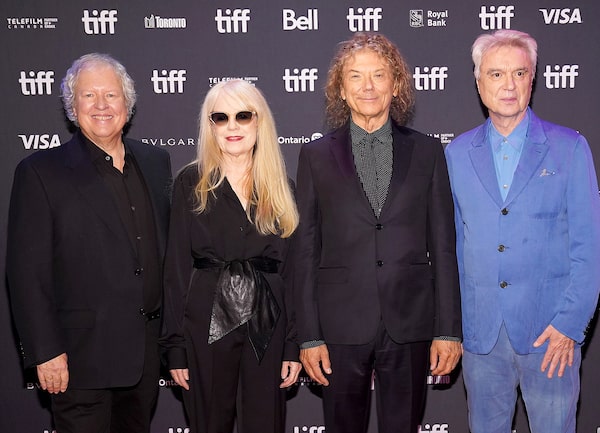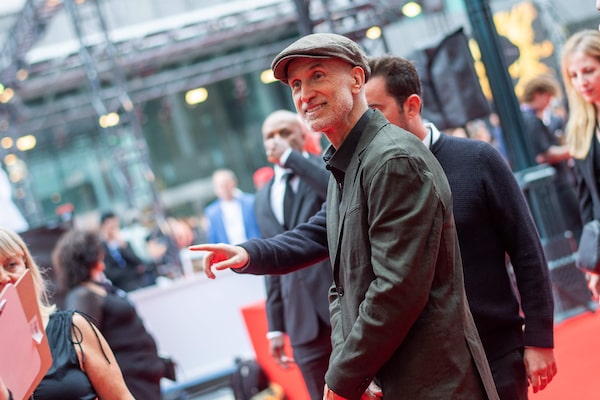
From the left: Chris Frantz, Tina Weymouth, Jerry Harrison and David Byrne attend the Stop Making Sense premiere during the 2023 Toronto International Film Festival at Scotiabank Theatre on Sept. 11.Shawn Goldberg/Getty Images
The Globe and Mail’s film festival writers present the highs, lows and all the moments in between from this year’s Toronto International Film Festival, which wraps up this Sunday.
Best Burning Down of the House
When TIFF CEO Cameron Bailey asked the sold-out crowd at Monday’s world premiere of the remastered, IMAX version of the Talking Heads concert film Stop Making Sense, “Who saw the original concert?” not many people raised their hands. But I did: Oct. 12, 1983, University Hall at the University of Virginia in Charlottesville. I was 21. I saw Jonathan Demme’s startlingly intimate, exciting film when it came out, but hadn’t watched it since. I’ve gotten used to gray-haired, 2000s-era David Byrne, so the first shot of 1983 Byrne made me gasp. So young. I was seated next to a lovely 19-year-old woman, whose punk parents had introduced her to her now-favourite band; she’d dragged a male friend with her, sure that he’d love them, too. When the opening notes of Burning Down the House sounded, she was the first one on her feet to dance. Group by group the normally staid Toronto crowd rose to join her, and stayed up, gyrating in the dark. At the livestreamed Q&A after, Byrne said that Demme’s genius was treating the band as an ensemble cast, introducing each character and developing relationships. I wept through it all – because that’s what happens when you open a time capsule, and a portal in time. Johanna Schneller
Best Hiding-In-Plain-Sight Surprise
So many directors turn to autobiography for their first features, but with Woman of the Hour, the actress Anna Kendrick did it in disguise. She’s a tiny, pretty woman in Hollywood; I suspect she’s been underestimated enough that she could easily live in a permanent state of fury. In Woman of the Hour, she channels that fury into the true story of dozens of women who fell prey to a serial rapist and murderer in the 1970s, and the dozens who tried to report him and were ignored. Playing a struggling actress who appears on The Dating Game, she shows us how speedily a woman goes from being called adorable to being cursed out if she doesn’t behave. I, too, underestimated Kendrick. She blew me away. J.S.
Best Advertisement for New Sponsors
TIFF has endured an unusually tough round of headlines involving corporate sponsorships. So maybe it shouldn’t have been such a shock to see some remarkably bad preshow advertisements from the film festival’s regular partners. Lead sponsor Bell seems to already be eyeing the exit door with its ad invoking a dreadful stereotype about seemingly queer actors playing straight roles. But at least the telecom tried something new. Cineplex simply reused its “we support festival volunteers” spot from the previous year – guys, could you not just bury the hatchet and hire Tanner Zipchen to lead a new commercial instead of the old and grammatically incorrect one (”no guest goes unmeeted!”)? – while Bulgari appeared to deploy a very light re-edit of its Zendaya/Anne Hathaway clip from 2022. Barry Hertz
Weirdest Programming Trends
Every new year of TIFF guarantees some unintentional trends among the 200-plus premieres. But this year’s batch felt especially preordained by the cinematic gods. There were two movies about assassins losing their grip (Richard Linklater’s wonderful Hit Man, Michael Keaton’s dreadful Knox Goes Away), two films in which German actress Sandra Huller hates her husband (Anatomy of a Fall and The Zone of Interest), three films in which Nick Offerman played the very worst men that America has to offer (his hedge-fund bully in Dumb Money, MAGA-hatted racist in Origin, and rampant homophobe in Dicks: The Musical), and, most bizarrely of all, two titles in which David Byrne’s giant Talking Heads suit figure prominently (that would be Stop Making Sense, of course, but also the Nicolas Cage dark comedy Dream Scenario, oddly enough). B.H.

Australian director Craig Gillespie arrives for the premiere of Dumb Money at the Roy Thomson Hall in Toronto on Sept. 8.VALERIE MACON/AFP/Getty Images
Most Awkward Interview
While chatting about his film Dumb Money, a crowd-pleasing comedic drama about small-time investors who stymied Wall Street, director Craig Gillespie was asked which scene he thought might have received the biggest laugh at a press screening. “The scene where Seth Rogen wipes off his makeup?” he guessed. Nope, it was when the credits rolled: Twin entrepreneurs Cameron and Tyler Winklevoss, made famous when played to loathsome effect by Armie Hammer in The Social Network, are listed as executive producers on Dumb Money. “Ah, they recognized the irony of it,” Gillespie said, disappointed, perhaps also recognizing the irony of a lively film’s credits getting the biggest laugh. Brad Wheeler
Social Distancing Is So Over
It’s like the pandemic-era editions of TIFF never happened. At one sold-out screening, fans lined up on the sidewalk were told by a festival wrangler to “get uncomfortably close to each other.” Some people were still wearing masks as a new COVID variant has caused an uptick in cases, but social distancing is a distant memory now as TIFF and everyone else throws caution and airborne particles to the wind. B.W.
Most Uncomfortable Moment
Quebec director Louise Archambault appeared on stage at the end of her film Irena’s Vow visibly angry. The sound had been cut on the last few minutes of the screening, and these scenes were not merely credits but brief documentary shots of the real people involved in this heroic Holocaust drama. Programmer Norm Wilner tried to reassure her that the audience was with her, and ready to hear more about the making of the film, shot last year in Poland not far from the Ukrainian border soon after the Russian invasion. Archambault, however, was not to be dissuaded from expressing her deep disapproval of the proceedings. Luckily, the lineup for the Q&A included two living witnesses to the work of Irena Gut, the subject of the film. During the war, she rescued a dozen Polish Jews by hiding them in the cellar of the German officer’s house where she worked. Gut died in 2003 but her daughter was present to speak to the film’s relevance as a statement of resistance to authoritarianism. So too was Roman Haller, now a senior citizen but once a baby only born because Gut convinced one of the hidden Jews that she could carry her pregnancy to term. Real people made up for missing sound. Kate Taylor
Director Atom Egoyan, Producer Simone Urdi, and cast members Vinessa Antoine, Rebecca Liddiard, Lanette Ware, Maia Jae Bastidas, Aliya Kanani, Mark O'Brien, and Douglas Smith pose during the world premiere of Seven Veils on Sept. 10.CARLOS OSORIO/Reuters
Most Meta Experience
Atom Egoyan’s new film Seven Veils opens with a long shot of the empty auditorium of the Four Seasons Centre, the very same space where the film’s audience was sitting for the TIFF premiere. It was an impressive mirroring that was to continue all evening. The opera-and-ballet house doesn’t usually host film screenings but this one was different. Seven Veils features a woman restaging her dead mentor’s production of Salomé (without much help from difficult singers and skeptical management) and was shot last February during the Canadian Opera Company’s rehearsals for its Salomé, which Egoyan first directed in 1996. The film features many appearances from the Four Seasons auditorium, its stage and COC rehearsal halls as well as performances by the singers from the stage production playing versions of themselves. Many of these elements were filmed this year as Egoyan squeezed his shooting schedule around the opera remount he was also directing; some of them are his own archival footage of previous revivals of Salomé at the COC. As the film unfurled it became difficult in parts to distinguish where performance document ended and filmed fiction began; viewers left this mind-bender through the glass lobby where the film’s first lines are spoken. K.T.